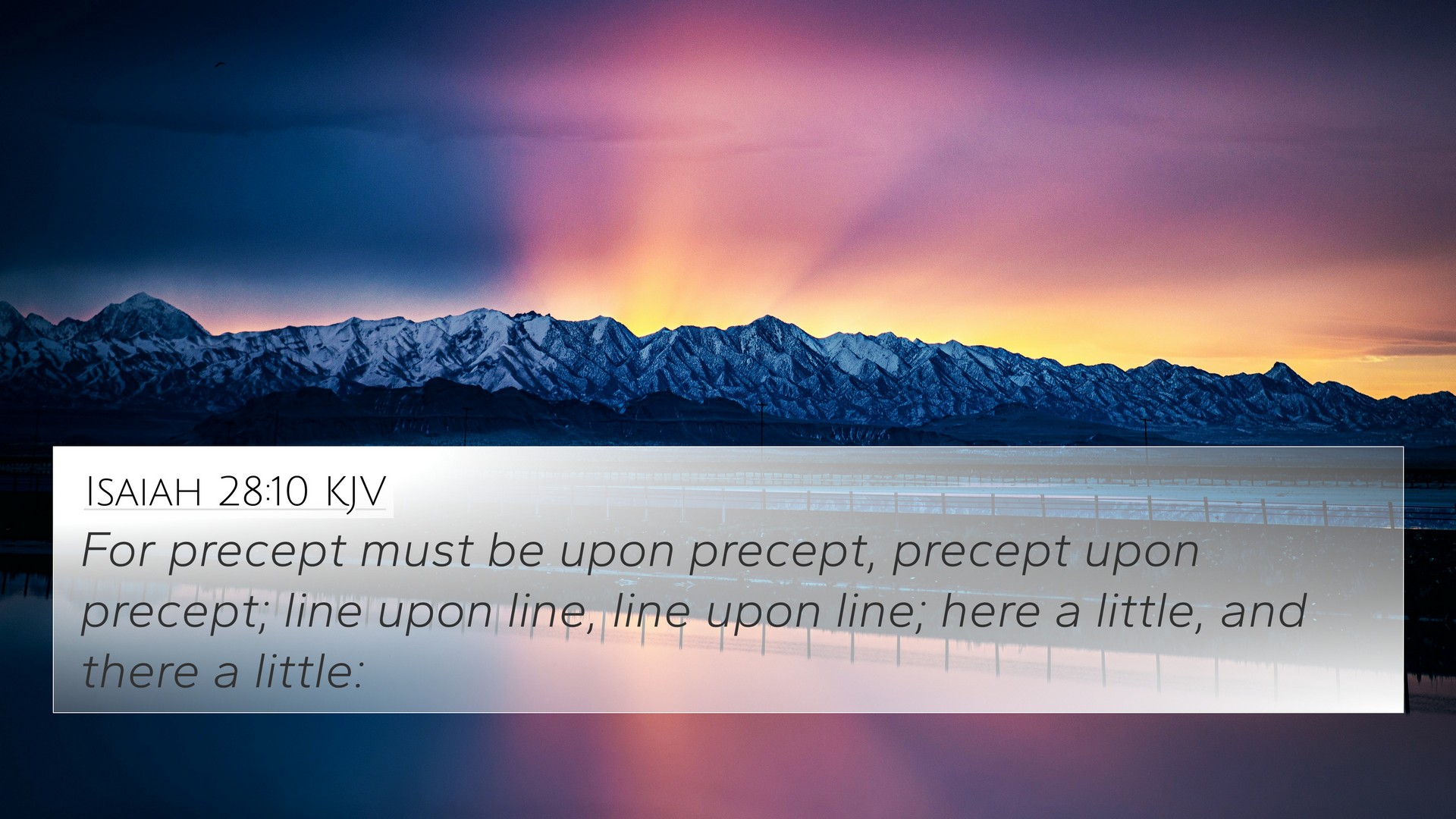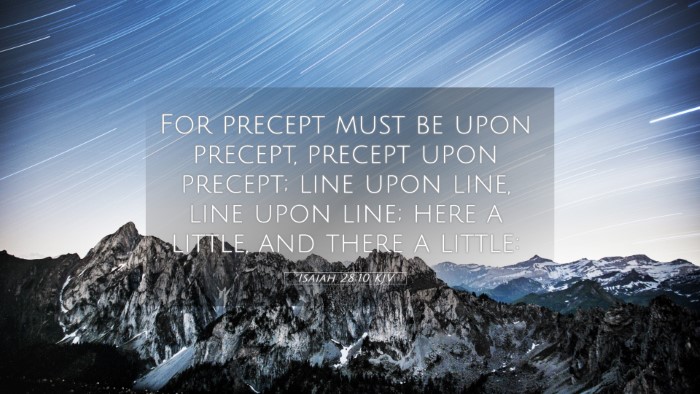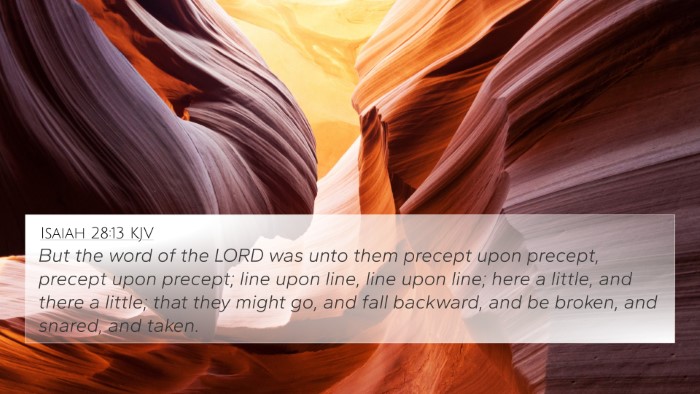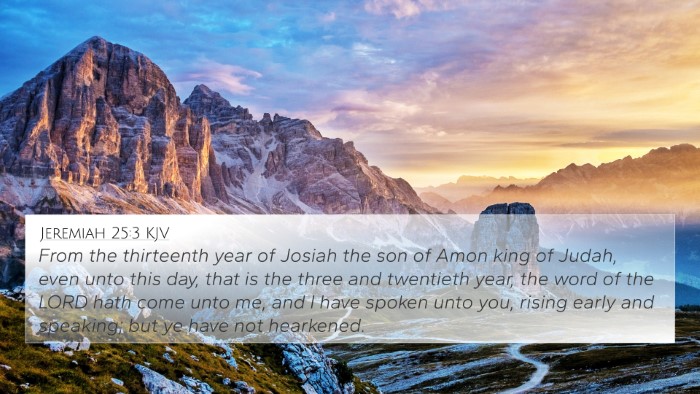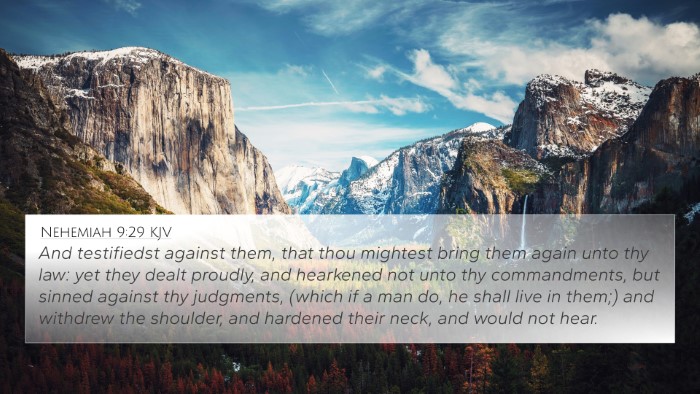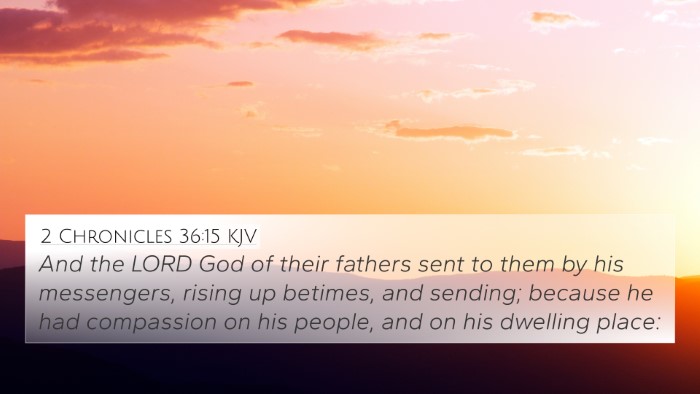Understanding Isaiah 28:10
Isaiah 28:10 is a significant verse in the book of Isaiah, reflecting on the complexity and depth of God’s communication through His word. This verse states:
“For precept must be upon precept, precept upon precept; line upon line, line upon line; here a little, and there a little.”
To fully comprehend this verse, we can explore its meaning through the lens of public domain commentaries such as those by Matthew Henry, Albert Barnes, and Adam Clarke. Below, we will summarize their insights and connect them to related scriptures for a comprehensive analysis.
Verse Analysis
This verse highlights a fundamental principle of God's instruction. It indicates that understanding divine truths requires careful and gradual learning, emphasizing the importance of building knowledge step by step.
Commentary Insights
-
Matthew Henry:
Henry explains that God’s ways and teachings are often delivered in a layered and progressive manner. The “precept upon precept” signifies the necessity of foundational teachings before advancing to deeper revelations. It serves to illustrate how God's wisdom is unveiled through a process of teaching and learning.
-
Albert Barnes:
Barnes interprets this verse as God's method of dealing with His people. He stresses that the use of repetitious structures in the phrases demonstrates the importance of reinforcement in learning divine truth. Barnes notes that this verse reflects the manner in which God appeals to human understanding, offering truths in manageable portions.
-
Adam Clarke:
Clarke emphasizes that this verse outlines the method of divine instruction, breaking down complex truths into simpler components. The mention of “here a little, and there a little” indicates that God often teaches people in varied contexts and circumstances, allowing them to grasp the essence of His Word progressively.
Connecting Scriptures
To further deepen our understanding of Isaiah 28:10, we can cross-reference several Bible verses that highlight similar themes of instruction, learning, and divine wisdom:
- Proverbs 1:5: “A wise man will hear, and will increase learning; and a man of understanding shall attain unto wise counsels.”
- 2 Timothy 3:16-17: “All Scripture is given by inspiration of God, and is profitable for doctrine, for reproof, for correction, for instruction in righteousness...”
- Hebrews 5:12: “For when for the time ye ought to be teachers, ye have need that one teach you again which be the first principles of the oracles of God...”
- Psalm 119:105: “Thy word is a lamp unto my feet, and a light unto my path.”
- John 16:12: “I have yet many things to say unto you, but ye cannot bear them now.”
- 1 Peter 2:2: “As newborn babes, desire the sincere milk of the word, that ye may grow thereby.”
- Matthew 28:20: “Teaching them to observe all things whatsoever I have commanded you...”
Primary Themes
Several primary themes emerge from Isaiah 28:10, which can be supported by its related scriptures:
- The Importance of Gradual Learning: Just as children are taught step by step, so are we in our spiritual journey.
- Divine Instruction: God's method of teaching through gradual revelation is consistent throughout the scriptures.
- The Need for Repetition: Repeatedly emphasizing principles helps solidify understanding and application.
Cross-Referencing Insights
Understanding Isaiah 28:10 also involves recognizing the broader context and connections between various biblical texts:
- How to Use Bible Cross-References: Effectively using tools such as a Bible concordance can enhance your study and help identify these links.
- Identifying Connections: Seek verses that connect Old and New Testament themes; they often illuminate God’s consistent nature and teaching style.
- Bible Reference Resources: Utilize comprehensive Bible cross-reference materials to explore more connections between verses.
Conclusion
Isaiah 28:10 serves as an encouragement in our pursuit of understanding biblical truths. It reassures us that learning is a process, where God gently guides us through His word. By connecting different scriptures, one can see the unified message of God's instruction and the importance of gradual growth in our faith. Exploring the thematic connections, repetition in teaching, and the methodical approach God uses will enrich your study of the Bible.
Further Reflections
As you meditate on Isaiah 28:10, consider how you can apply these principles in your own life. Reflecting on the gradual nature of spiritual growth allows for patience and perseverance in your journey. Utilize these insights for personal study or for preparing sermons, and be open to how God reveals His truths to you over time.
